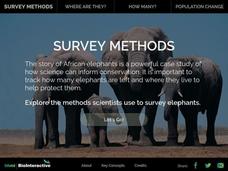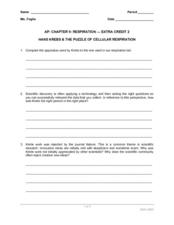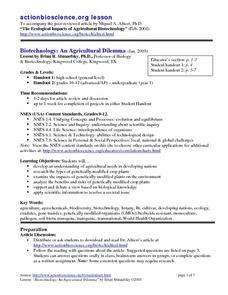Howard Hughes Medical Institute
Survey Methods
How many African elephants are on earth? How do scientists answer a question like that? An interactive resource explains a variety of survey methods and their advantages and disadvantages. It connects the need for a survey to...
National Center for Case Study Teaching in Science
Identical Twins, Identical Fates?
Can different personal experiences affect our genes? Find out in an intriguing case study about one twin who is diagnosed with mental illness and her identical twin who fears she may suffer the same fate. Designed for college-level...
Howard Hughes Medical Institute
How Animals Use Sound to Communicate
Communication involves the visual, auditory, olfactory, and tactile senses. Scholars observe groups of animals communicating through multiple senses. They note and learn why different species use different senses depending on their...
Howard Hughes Medical Institute
Testing a Hypothesis
Are sickle cell disease and malaria related somehow? Scholars learn about both illnesses and the hypotheses that they are related. They discuss, view a video, and answer questions to demonstrate understanding. The resource includes an...
Howard Hughes Medical Institute
The Molecular Evolution of Gene Birth and Death
An upper-level biology activity, the comprehensive worksheet found here accompanies a PowerPoint and the video The Making of the Fittest: The Birth and Death of Genes, both of which are linked to through the website. Depending on the...
Curated OER
AP BIO ch. 45 Hormones Word Search Puzzle
In this biology worksheet, students find the words that are in the word search puzzle that focus upon the vocabulary that is from the theme of the sheet.
Curated OER
Review for Strand 2A Test: Nervous System
Three pages containing 51 true and false questions make up this nervous system review. The major topics listed at the top of the test mention a film strip and a laboratory activity, but the questions appear to be answerable without...
Curated OER
Catalase: A Bioinformatics Case Study
Pupils investigate the physical structure of a protein by using a computer simulation tool. They record its primary amino acid structure while viewing it in three dimensions for a better visual recognition. There is also a comparison to...
National Center for Case Study Teaching in Science
A Deadly Passion
Depending on the level of maturity of your class, the case study presented here could be fascinating. It focuses on the mating behavior and post-mating rituals of the Australian redback spider, which involves the female eating the male...
Curated OER
Hans Krebs and the Puzzle of Cellular Respiration
Spark your biology buffs' critical thinking skills by assigning these questions about Hans Krebs and his work on biochemical processes. The first question refers to a respiration lab apparatus used in class, so you will want to precede...
Curated OER
Pesticides and Eggshell Thinning.
Students analyze the calcium content of egg shells as an introduction to the toxic effects of pesticides on biological systems.
Curated OER
Primate Characteristics and Exaptation
Students compare the features of gorilla to humans. In this biology lesson, students simulate adaptation using materials found in the classroom. They explain what exaptation means.
Curated OER
The Genetics of Antibody Diversity
Young scholars distinguish between the light and heavy chain sections. In this biology lesson, students simulate the DNA splicing process. They calculate antibody diversity using the information given.
Curated OER
The Value of a Garden
Students will work cooperatively. In this environmental lesson plan, students will start by discussing an article and its questions prior to receiving a handout. There are two versions of the handout depending if your students are AP or...
Curated OER
Connecticut Wildlife: Biodiversity and Conservation Status of Our Vertebrate Populations
Students explore the different types of vertebrates found in their area. In this environmental science activity, students perform a case study on the Common Raven. They analyze data collected from research and create charts and graphs.
Curated OER
Visualizing a Human Gene with Its Introns & Exons
Students examine the entire DNA base sequence of the human adenosine deaminase gene after it is printed out from the source disk provided. The enormous length of a single gene as well as the immense difference in length between intron...
Curated OER
Science Lesson Plans
Young scholars conduct a variety of exploration activities on various science topics. In this science lesson outline, students design a cell encapsulation to hold a specific type of medicine. They give examples of physical and chemical...
Curated OER
Determination of Phylogenetic Relationships Using Restriction Analysis
Students applied various mathematical analyses to interpret their data. By using the resulting DNA fragment patterns from several enzymes students established a possible evolutionary relationship among the mice.
Curated OER
Teaching Biotechnology With Models
Students will construct models to obtain understanding about the scientific concept. The kinesthetic learners will benefit from the project. There is ample opportunity for all types of learners to be engaged in this lesson.
Curated OER
Applied Evolution: How Will We Get There from Here?
Learners explore the basic process of natural selection and how people can manipulate that process today. The consequences of natural selection on daily life and the implications of evolutionary biology in basic and applied science is...
Curated OER
Biotechnology: An Agricultural Dilemma
Learners investigate the types of genetically modified crop plants there are and the benefits and risks of such plants. The agricultural needs in developing nations for this biological knowledge to resolve societal issues is also...
Curated OER
Ecosystems
In this ecosystems worksheet, students complete a crossword puzzle with 35 questions about the different types of ecosystems and organisms in them.
Howard Hughes Medical Institute
Winogradsky Columns: Microbial Ecology in the Classroom
Substances that decompose with the help of living organisms do so at different rates. Scholars experiment with Winogradsky columns to determine the rate of decomposition, the oxygen and sulfide content changes, and bacteria levels. The...
Howard Hughes Medical Institute
Natural Selection and Evolution of Rock Pocket Mouse Populations
Can evolution repeat itself? Scholars analyze amino acid data in two separate populations of mice. They learn that evolution repeats itself, but natural selection prefers some mutations over others in different environments. Analysis...
Other popular searches
- Ap Biology Lesson Plans
- Ap Biology Vocabulary
- Ap Biology Unit 1
- Ap Biology Cells
- Ap Biology Evolution
- Ap Biology Respiration
- Ap Biology Bacteria
- Ap Biology Photosynthesis
- Ap Biology Animals
- Ap Biology Heart
- Diabetes Ap Biology
- Ap Biology Chemistry

























